| Western blot (WB): | 1:500-2000 |
| Immunohistochemistry (IHC): | 1:50-400 |
| Flow Cytometry (Fixed): | 1:50-200 |
| (Boiling the paraffin sections in 10mM citrate buffer,pH6.0,or PH8.0 EDTA repair liquid for 20 mins is required for the staining of formalin/paraffin sections.) Optimal working dilutions must be determined by end user. | |
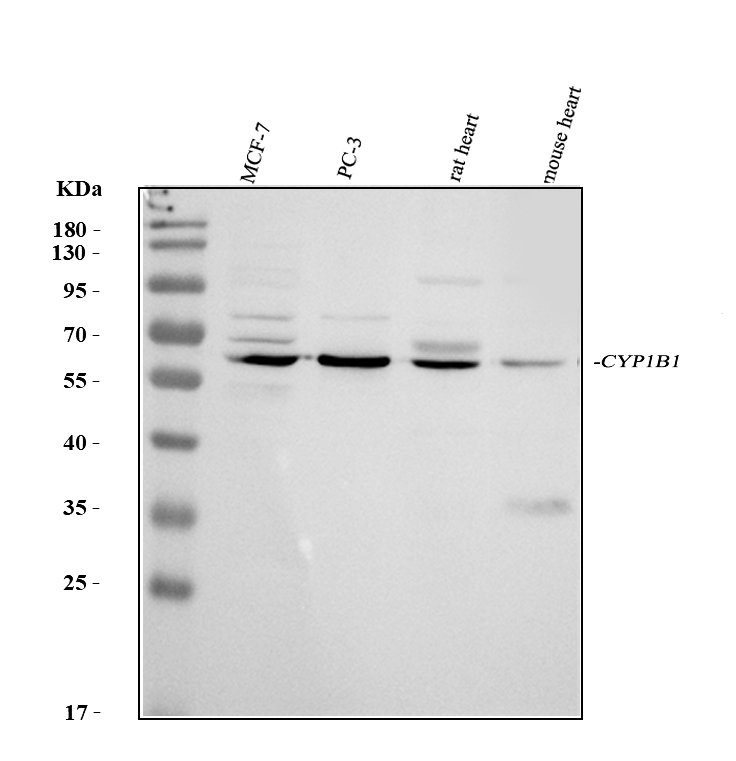
Figure 1. Western blot analysis of anti- CYP1B1 antibody (PB9546). The sample well of each lane was loaded with 50ug of sample under reducing conditions.
Lane 1: MCF-7 whole cell lysates,
Lane 2: PC-3 whole cell lysates,
Lane 3: rat heart tissue lysates,
Lane 4: mouse heart tissue lysates.
Use rabbit anti- CYP1B1 1:1000, probed with a goat anti-rabbit IgG-HRP secondary antibody. The signal is developed using an Enhanced Chemiluminescent detection (ECL) kit (Catalog # EK1002). A specific band was detected for CYP1B1 at approximately 61KD. The expected band size for CYP1B1 is at 61KD.
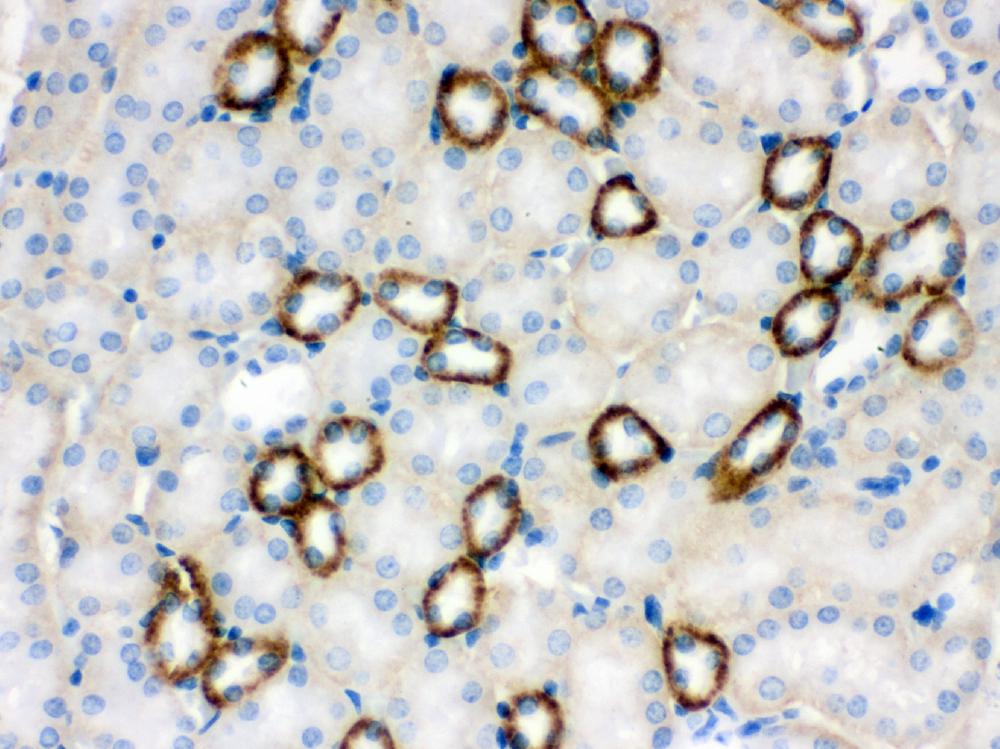
Figure 2. IHC analysis of CYP1B1 using anti-CYP1B1 antibody (PB9546).CYP1B1 was detected in paraffin-embedded section of Mouse Kidney Tissue. Heat mediated antigen retrieval was performed in citrate buffer (pH6, epitope retrieval solution) for 20 mins. The tissue section was blocked with 10% goat serum. The tissue section was then incubated with 1μg/ml rabbit anti-CYP1B1 Antibody (PB9546) overnight at 4°C. Biotinylated goat anti-rabbit IgG was used as secondary antibody and incubated for 30 minutes at 37°C. The tissue section was developed using Strepavidin-Biotin-Complex (SABC)(Catalog # SA1022) with DAB as the chromogen.
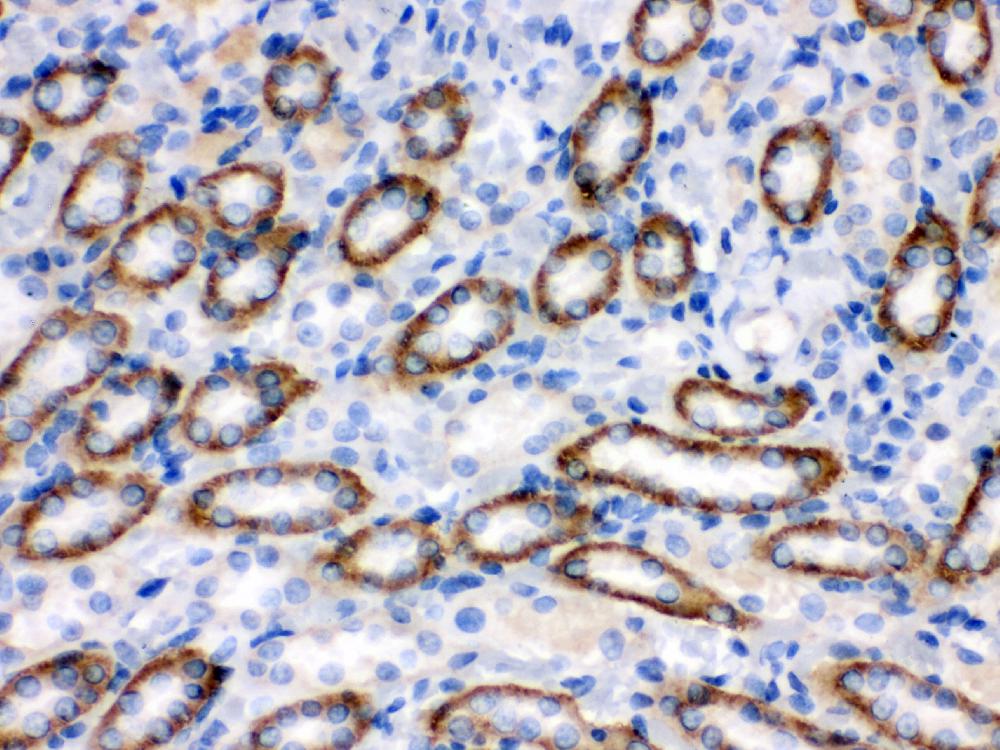
Figure 3. IHC analysis of CYP1B1 using anti-CYP1B1 antibody (PB9546).CYP1B1 was detected in paraffin-embedded section of Rat Kidney Tissue. Heat mediated antigen retrieval was performed in citrate buffer (pH6, epitope retrieval solution) for 20 mins. The tissue section was blocked with 10% goat serum. The tissue section was then incubated with 1μg/ml rabbit anti-CYP1B1 Antibody (PB9546) overnight at 4°C. Biotinylated goat anti-rabbit IgG was used as secondary antibody and incubated for 30 minutes at 37°C. The tissue section was developed using Strepavidin-Biotin-Complex (SABC)(Catalog # SA1022) with DAB as the chromogen.
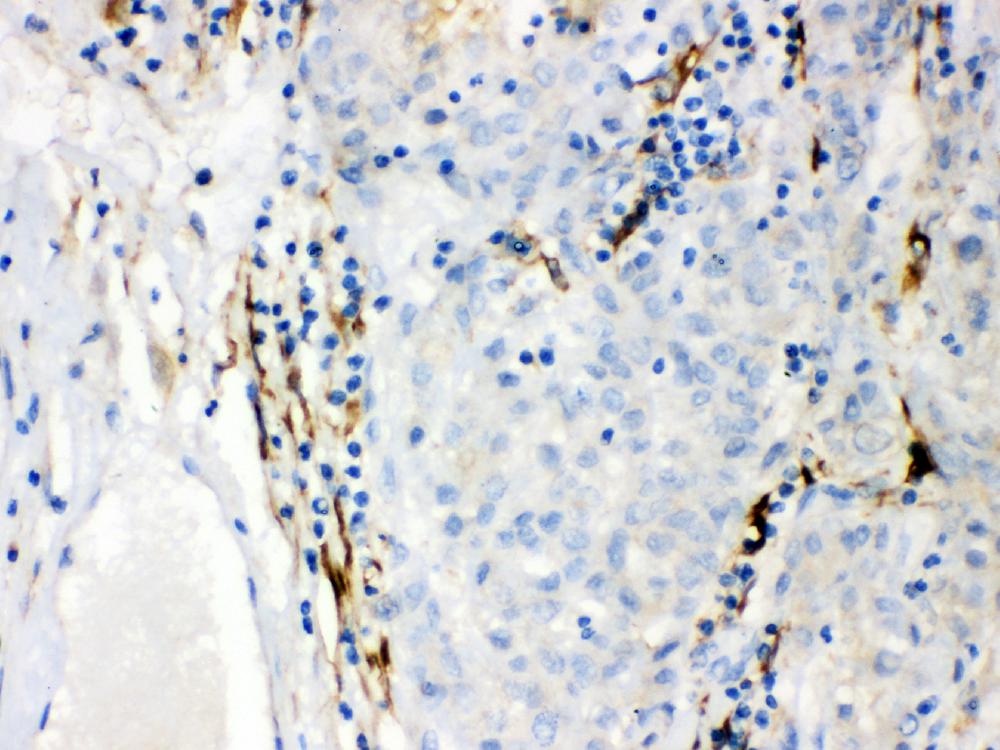
Figure 4. IHC analysis of CYP1B1 using anti-CYP1B1 antibody (PB9546).CYP1B1 was detected in paraffin-embedded section of Human Liver Cancer Tissue. Heat mediated antigen retrieval was performed in citrate buffer (pH6, epitope retrieval solution) for 20 mins. The tissue section was blocked with 10% goat serum. The tissue section was then incubated with 1μg/ml rabbit anti-CYP1B1 Antibody (PB9546) overnight at 4°C. Biotinylated goat anti-rabbit IgG was used as secondary antibody and incubated for 30 minutes at 37°C. The tissue section was developed using Strepavidin-Biotin-Complex (SABC)(Catalog # SA1022) with DAB as the chromogen.
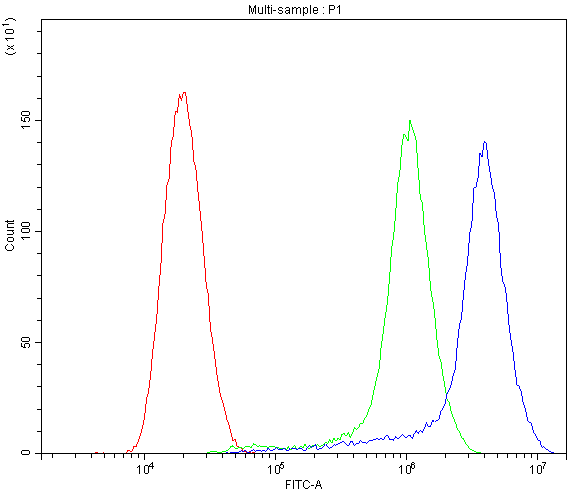
Figure 5. Flow Cytometry analysis of SiHa cells using anti-CYP1B1 antibody (PB9546).Overlay histogram showing SiHa cells stained with PB9546 (Blue line).The cells were blocked with 10% normal goat serum. And then incubated with rabbit anti-CYP1B1 Antibody (PB9546, 1:100) for 30 min at 20°C. DyLight®488 conjugated goat anti-rabbit IgG (BA1127, 1:100) was used as secondary antibody for 30 minutes at 20°C. Isotype control antibody (Green line) was rabbit IgG (1:100) used under the same conditions. Unlabelled sample (Red line) was also used as a control.

Figure 1. Western blot analysis of anti- CYP1B1 antibody (PB9546). The sample well of each lane was loaded with 50ug of sample under reducing conditions.
Lane 1: MCF-7 whole cell lysates,
Lane 2: PC-3 whole cell lysates,
Lane 3: rat heart tissue lysates,
Lane 4: mouse heart tissue lysates.
Use rabbit anti- CYP1B1 1:1000, probed with a goat anti-rabbit IgG-HRP secondary antibody. The signal is developed using an Enhanced Chemiluminescent detection (ECL) kit (Catalog # EK1002). A specific band was detected for CYP1B1 at approximately 61KD. The expected band size for CYP1B1 is at 61KD.

Figure 2. IHC analysis of CYP1B1 using anti-CYP1B1 antibody (PB9546).CYP1B1 was detected in paraffin-embedded section of Mouse Kidney Tissue. Heat mediated antigen retrieval was performed in citrate buffer (pH6, epitope retrieval solution) for 20 mins. The tissue section was blocked with 10% goat serum. The tissue section was then incubated with 1μg/ml rabbit anti-CYP1B1 Antibody (PB9546) overnight at 4°C. Biotinylated goat anti-rabbit IgG was used as secondary antibody and incubated for 30 minutes at 37°C. The tissue section was developed using Strepavidin-Biotin-Complex (SABC)(Catalog # SA1022) with DAB as the chromogen.

Figure 3. IHC analysis of CYP1B1 using anti-CYP1B1 antibody (PB9546).CYP1B1 was detected in paraffin-embedded section of Rat Kidney Tissue. Heat mediated antigen retrieval was performed in citrate buffer (pH6, epitope retrieval solution) for 20 mins. The tissue section was blocked with 10% goat serum. The tissue section was then incubated with 1μg/ml rabbit anti-CYP1B1 Antibody (PB9546) overnight at 4°C. Biotinylated goat anti-rabbit IgG was used as secondary antibody and incubated for 30 minutes at 37°C. The tissue section was developed using Strepavidin-Biotin-Complex (SABC)(Catalog # SA1022) with DAB as the chromogen.

Figure 4. IHC analysis of CYP1B1 using anti-CYP1B1 antibody (PB9546).CYP1B1 was detected in paraffin-embedded section of Human Liver Cancer Tissue. Heat mediated antigen retrieval was performed in citrate buffer (pH6, epitope retrieval solution) for 20 mins. The tissue section was blocked with 10% goat serum. The tissue section was then incubated with 1μg/ml rabbit anti-CYP1B1 Antibody (PB9546) overnight at 4°C. Biotinylated goat anti-rabbit IgG was used as secondary antibody and incubated for 30 minutes at 37°C. The tissue section was developed using Strepavidin-Biotin-Complex (SABC)(Catalog # SA1022) with DAB as the chromogen.

Figure 5. Flow Cytometry analysis of SiHa cells using anti-CYP1B1 antibody (PB9546).Overlay histogram showing SiHa cells stained with PB9546 (Blue line).The cells were blocked with 10% normal goat serum. And then incubated with rabbit anti-CYP1B1 Antibody (PB9546, 1:100) for 30 min at 20°C. DyLight®488 conjugated goat anti-rabbit IgG (BA1127, 1:100) was used as secondary antibody for 30 minutes at 20°C. Isotype control antibody (Green line) was rabbit IgG (1:100) used under the same conditions. Unlabelled sample (Red line) was also used as a control.




